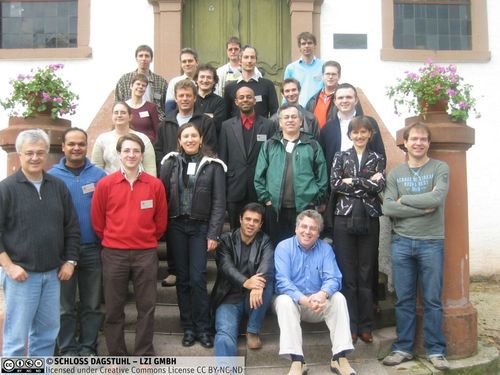Dagstuhl Seminar 06431
Scalable Data Management in Evolving Networks
( Oct 22 – Oct 27, 2006 )
Permalink
Organizers
- Stefan Böttcher (Universität Paderborn, DE)
- Le Gruenwald (NSF - Arlington, US)
- Pedro Jose Marrón (Universität Stuttgart, DE)
- Evaggelia Pitoura (University of Ioannina, GR)
Contact
Data management technologies have been widely used in fixed-wired networks within the last two decades. Scalable technologies for query evaluation, transaction management and data storage have been developed for client-server systems and are widely used in industry. Nevertheless, key data management technologies are limited in their support of evolving networks including mobile ad-hoc networks (MANETs), peer-to-peer (P2P) systems, and sensor networks. More specifically, current database system technologies lack sufficient features for handling the mobility and ad-hoc aspects of many networking infrastructures. This includes cross-layer optimization involving network and data management aspects, location based data management and optimization, and mechanisms for handling error situations, such as node failures, link failures, and network partitioning. Therefore, an adaptation of current data management technologies and their applications to mobility and ad-hoc requirements is essential for them to be useful to mobile users.
During this one week seminar, the 25 participants that came to Dagstuhl were actively involved in discussions about these topics and discussed the requirements and protocols for atomic transactions in mobile environments, the role and definition of P2P databases, and the differences in characteristics of environments like MANETs, P2P, and sensor networks.
One focused working group discussed the application scenarios, the technical requirements, and the open research questions for atomic transaction commitment in mobile ad-hoc environments. After collecting the requirements in different application fields ranging from emergency scenarios to mobile business and mobile gaming, the group investigated how the requirements are met by current atomic commit protocol implementations. One of the conclusions drawn was that although much research has been contributed to this field, the atomic commit problem is still open and unsolved for server-less applications and a demand for further research in this area exists.
Another focused working group discussed key requirements for P2P databases. Since P2P systems allow new forms of data and resource sharing among fast-changing communities having thousands of users, new ways of modelling, indexing, storing and querying data are required and must be adapted to P2P overlay structures.
The third working group discussed and compared a huge variety of extensions of conventional data management technologies that have been proposed for meeting the particular requirements of MANETs, P2P, and sensor networks. The discussion focused on the aspects of “typical application requirements” and “core technologies required for meeting the application requirements”. One of the conclusions was that MANETs, P2P, and sensor networks have a lot of common additional requirements beyond standard database technology, but they are used in very different scenarios, which have different requirements.
Additionally, there were four inspiring overview talks on data management in sensor networks, middleware approaches for sensor networks, personalization for the wireless user, and location-based services, which were followed by interesting discussions on further research directions in the whole group.
Finally, a couple of spontaneous ad-hoc organized discussions deepened some aspects of the workshop, for example, a discussion on a comparison of specific atomic commit protocols for MANETs, a discussion on data compression techniques, as well as more general discussions like how to teach the major results in the field.
Altogether, the seminar offered an excellent opportunity to share experiences and compare different contributions to data management in evolving networks from all the above areas, i.e. MANETs, P2P and sensor networks. We are convinced that a better understanding of problems that are common to different areas of data management in evolving networks has been achieved, and that this will result in synergetic effects in further research. All in all, the seminar was very successful and offered researchers of various disciplines from different countries an opportunity to share their experiences and expertise in a setting that is, as always, both inspiring for deep thoughts and pleasurable for idea exchanges.
A Perspectives Workshop where similar topics were discussed was held in Dagstuhl in March 2005:
"Peer-to-Peer Mobile Ad Hoc Networks - New Research Issues", Organizers: M. Gerla (Univ. California - Los Angeles, US), C. Lindemann (Universität Dortmund, DE), A. Rowstron (Microsoft Research, GB). Manifesto here .
- Peter A. Boncz (CWI - Amsterdam, NL) [dblp]
- Angela Bonifati (ICAR-CNR - Rende, IT) [dblp]
- Joos-Hendrik Böse (FU Berlin, DE) [dblp]
- Stefan Böttcher (Universität Paderborn, DE) [dblp]
- Panos Kypros Chrysanthis (University of Pittsburgh, US) [dblp]
- Alex Delis (University of Athens, GR)
- Le Gruenwald (NSF - Arlington, US)
- Rita Hartel (Universität Paderborn, DE) [dblp]
- Arantza Illarramendi (Universidad del País Vasco - Donostia, ES)
- Peter Janacik (Universität Paderborn, DE)
- Birgitta König-Ries (Universität Jena, DE) [dblp]
- Wolfgang Lehner (TU Dresden, DE) [dblp]
- Pedro Jose Marrón (Universität Stuttgart, DE)
- Wolfgang May (Universität Göttingen, DE)
- Anirban Mondal (University of Tokyo, JP)
- Sebastian Obermeier (Universität Paderborn, DE)
- Aris Ouksel (University of Illinois at Chicago, US)
- Kay Römer (ETH Zürich, CH) [dblp]
- George Samaras (University of Cyprus, CY)
- Brahmananda Sapkota (National University of Ireland - Galway, IE)
- Kai-Uwe Sattler (TU Ilmenau, DE) [dblp]
- Heinz Schweppe (FU Berlin, DE)
- Can Türker (ETH Zürich, CH)
- Stratis D. Viglas (University of Edinburgh, GB) [dblp]
Classification
- Databases / Networks
Keywords
- Data management
- mobile ad-hoc networks
- p2p systems
- sensor networks


